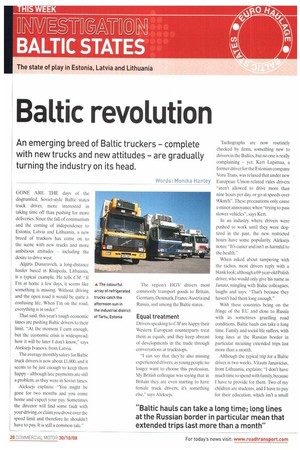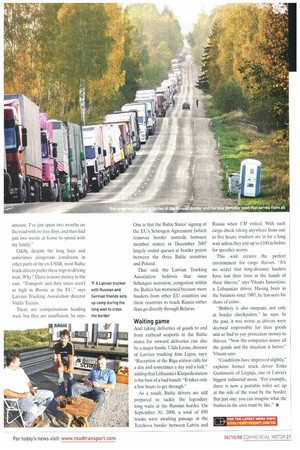Baltic revolution
Page 20

Page 21

If you've noticed an error in this article please click here to report it so we can fix it.
An emerging breed of Baltic truckers complete with new trucks and new attitudes are gradually turning the industry on its head.
Words: Monika Hanley GONE ARE THE days of the disgruntled, Soviet-style Baltic states truck driver, more interested in taking time off than pushing for more deliveries. Since the fall of communism and the coming of independence to Estonia, Latvia and Lithuania, a new breed of truckers has come on to the scene with new trucks and more ambitious attitudes — including the desire to drive west.
Algirts Dunaravich, a long-distance hauler based in Klaipeda, Lithuania, is a typical example. He tells CM: "If I'm at home a few days, it seems like something is missing. Without driving and the open road it would be quite a confusing life. When I'm on the road, everything is in order."
That said, this year's tough economic times are pushing Baltic drivers to their limit. "At the moment I earn enough, but the economic crisis is widespread; how it will be later I don't know," says Aleksejs Ivanovs, from Latvia, The average monthly salary for Baltic truck drivers is now about £1,000, and it seems to be just enough to keep them happy — although late payments are still a problem, as they were in Soviet times.
Aleksejs explains: "You might be gone for two months and you come home and expect your pay. Sometimes the director will find some fault with your driving, or claim you drove over the speed limit and therefore he shouldn't have to pay. It is still a common tale." The region's HGV drivers most commonly transport goods to Britain, Germany, Denmark, France Austria and Russia, and among the Baltic states.
Equal treatment
Drivers speaking to CM are happy their Western European counterparts treat them as equals, and they keep abreast of developments in the trade through conversations at truckstops.
"I can say that they're also missing experienced drivers, as young people no longer want to choose this profession. My British colleague was saying that in Britain they are even starting to have female truck drivers; it's something else," says Aleksejs. Tachographs are now routinely checked by firms, something new to drivers in the Bahia, but no one is really complaining — yet. Kert Lapimaa, a former driver for the Estonian company Voru Trans, was relaxed that under new European Union-related rules drivers "aren't allowed to drive more than nine hours per day, or go at speeds over 90km/h". These precautions only cause a minor annoyance when "trying to pass slower vehicles", says Kert.
In an industry where drivers were pushed to work until they were dogtired in the past, the new restricted hours have some popularity. Aleksejs notes: "It's easier and isn't as harmful to the health."
When asked about tampering with the tachos, most drivers reply with a blank look; although a 69-year-old Polish driver, who would only give his name as Janusz, mingling with Baltic colleagues, laughs and says: "That's because they haven't had them long enough."
With these countries being on the fringe of the EU and close to Russia with its sometimes gruelling road conditions, Baltic hauls can take a long time. Family and social life suffers, with long lines at the Russian border in particular meaning extended trips last more than a month.
Although the typical trip for a Baltic driver is two weeks, Vttauts Janavicius, from Lithuania, explains: "I don't have much time to spend with family, because I have to provide for them. Two of my children are students, and I have to pay for their education, which isn't a small amount. I've just spent two months on the road with no free days, and then had just two weeks at home to spend with my family."
Oddly, despite the long lines and sometimes dangerous conditions in other parts of the ex-USSR, most Baltic truck drivers prefer these trips to driving west. Why? There is more money in the east. "Transport and duty taxes aren't as high in Russia as the EU," says Latvian Trucking Association director Valdis Trezins.
There are compensations heading west, but they are insufficient, he says. One is that the Baltic States' signing of the EU's Schengen Agreement (which removes border controls between member states) in December 2007 largely ended queues at border points between the three Baltic countries and Poland.
That said, the Latvian Trucking Association believes that since Schengen accession, congestion within the Baltics has worsened because more hauliers from other EU countries use these countries to reach Russia rather than go directly through Belarus.
Waiting game And taking deliveries of goods to and from railhead seaports in the Baltic states for onward deliveries can also be a major hassle. Uldis Livins, director of Latvian trucking firm Ligna, says: "Reception at the Riga station calls for a day and sometimes a day and a half," adding that Lithuania's Klaipeda station is the best of a bad bunch: "It takes only a few hours to get through."
As a result, Baltic drivers are still prepared to tackle the legendary long waits at the Russian border. On September 30, 2008, a total of 850 trucks were awaiting passage at the Terehova border between Latvia and Russia when CM visited. With each cargo check taking anywhere from one to five hours, truckers are in for a long wait unless they pay up to £100 in bribes for speedier access.
This wait creates the perfect environment for cargo thieves. "It's no secret that long-distance haulers have lost their lives at the hands of these thieves," says Vitauts Janavicius, a Lithuanian driver. Having been in the business since 1985, he has seen his share of crime.
"Bribery is also rampant, not only at border checkpoints," he says. In the past, it was worse as drivers were deemed responsible for their goods and so had to pay protection money to thieves. "Now the companies insure all the goods and the situation is better," Vitauts says.
"Conditions have improved slightly," explains former truck driver Eriks Guntmanis of Liepaja, one of Latvia's biggest industrial areas. "For example, there is now a portable toilet set up at the side of the road by the border. But just one: you can imagine what the bushes in the area must be like." •




































































































































































